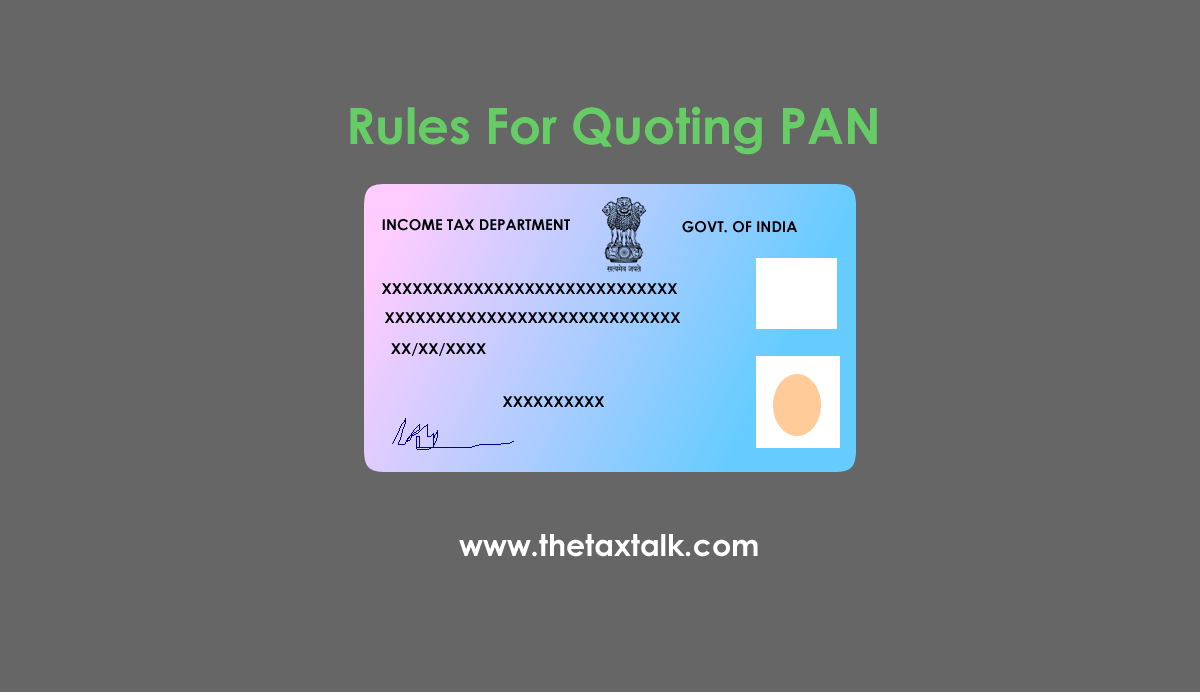![]()
Following are the transactions in which quoting of PAN is mandatory by every person except the Central Government, the State Governments and the Consular:
1) Sale or purchase of a motor vehicle or other than two wheeled vehicles.
2) Opening an account [other than a time-deposit referred at point No. 12 and a Basic Savings Bank Deposit Account] with a banking company or a co-operative bank
3) Making an application for issue of a credit or debit card.
4) Opening of a demat account with a depository, participant, custodian of securities or any other person with SEBI
5) Payment in cash of an amount exceeding Rs. 50,000 to a hotel or restaurant against bill at any one time.
6) Payment in cash of an amount exceeding Rs. 50,000 in connection with travel to any foreign country or payment for purchase of any foreign currency at any one time.
7) Payment of an amount exceeding Rs. 50,000 to a Mutual Fund for purchase of its units
8) Payment of an amount exceeding Rs. 50,000 to a company or an institution for acquiring debentures or bonds issued by it.
9) Payment of an amount exceeding Rs. 50,000 to the Reserve Bank of India for acquiring bonds issued by it.
10) Deposits of cash exceeding Rs. 50,000 during any one day with a banking company or a co-operative bank.
10A) Deposits of cash aggregating to more than Rs. 2,50,000 during the period of 09th November 2016 to 30th December 2016 with a banking company, cooperative bank or post office.
11) Payment in cash for an amount exceeding Rs. 50,000 during any one day for purchase of bank drafts or pay orders or banker’s cheques from a banking company or a co-operative bank.
12) A time deposit of amount exceeding Rs. 50,000 or aggregating to more than Rs. 5 lakh during a financial year with –
(i) a banking company or a co-operative bank
(ii) a Post Office;
(iii) a Nidhi referred to in section 406 of the Companies Act, 2013 or
(iv) a non-banking financial company
13) Payment in cash or by way of a bank draft or pay order or banker’s cheque of an amount aggregating to more than Rs. 50,000 in a financial year.for one or more pre-paid payment instruments, as defined in the policy guidelines for issuance and operation of pre-paid payment instruments issued by Reserve Bank of India under section 18 of the Payment and Settlement Systems Act, 2007 to a banking company or a co-operative bank or to any other company or institution.
14) Payment of an amount aggregating to more than Rs. 50,000 in a financial yearas life insurance premium to an insurer
15) A contract for sale or purchase of securities (other than shares) for amount exceeding Rs. 1 lakh per transaction
16) Sale or purchase, by any person, of shares of a company not listed in a recognised stock exchange for amount exceeding Rs. 1 lakh per transaction.
17) Sale or purchase of any immovable property for an amount exceeding Rs. 10 lakh or valued by stamp valuation authority referred to in section 50C of the Act at an amount exceeding ten lakh rupees.
18) Sale or purchase of goods or services of any nature other than those specified above for an amount exceeding Rs. 2 lakh per transaction.
19) Every person, not being an individual, which enters into a financial transaction of an amount aggregating to ₹ 2,50,000 or more in a financial year shall be required to apply to the Assessing Officer for allotment of PAN. Further, the managing director, director, partner, trustee, author, founder, karta, chief executive officer, principal officer or office bearer of such person or any person competent to act on behalf of suchperson would also be required to apply to the Assessing Officer for allotment of PAN. ( Introduced in 2018 budget)
NOTE:
1) Minor person can quote PAN of his father or mother or guardian provided he does not have any income chargeable to income-tax.
2) Any person, who does not have PAN and enters into any of above transaction, can make a declaration in Form No.60.
3) Quoting of PAN is not required by a non-resident in a transaction referred at point No. 3 or 5 or 6 or 9 or 11 or 13 or 18.
4) Any person who has an account (other than a time deposit referred at point no. 12 and a Basic Saving Bank Deposit Account) maintained with a banking company or a co-operative bank. He will be required to furnish his PAN or Form No.60 on or before 30-06-2017 if he has not quoted his PAN or furnished Form No. 60 at the time of opening of such account or subsequently.


